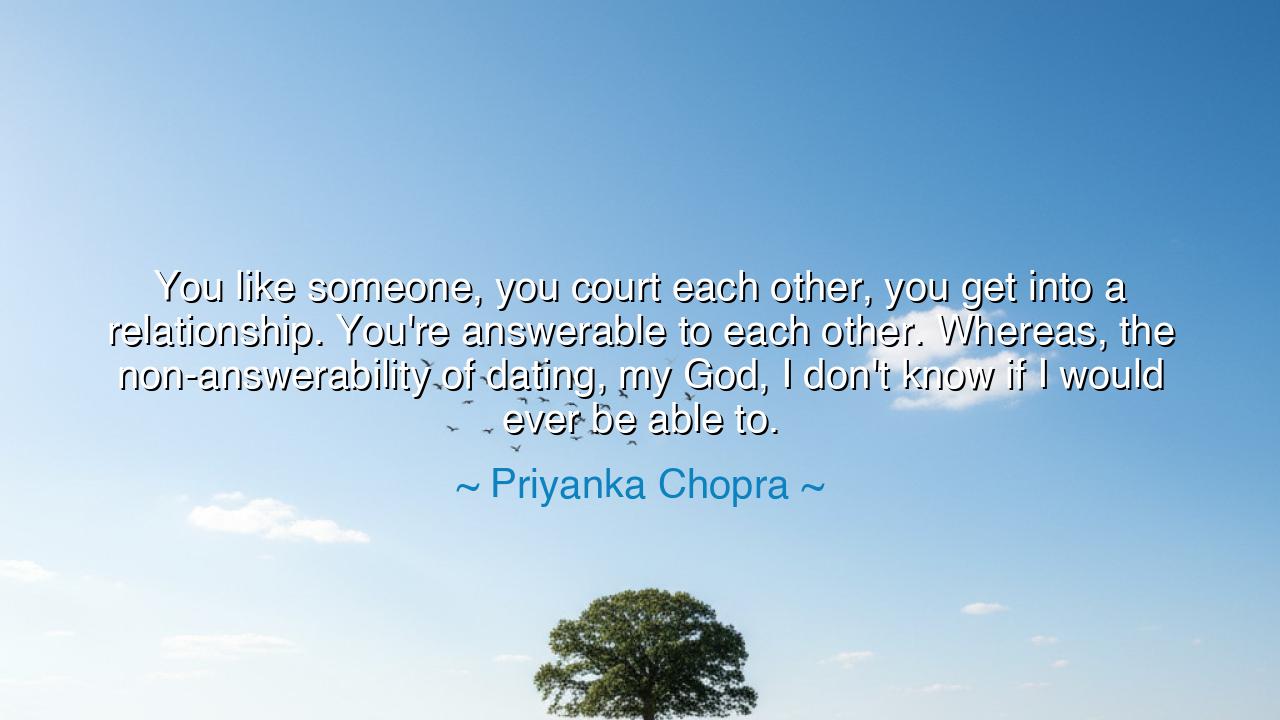
You like someone, you court each other, you get into a
You like someone, you court each other, you get into a relationship. You're answerable to each other. Whereas, the non-answerability of dating, my God, I don't know if I would ever be able to.






When Priyanka Chopra said, “You like someone, you court each other, you get into a relationship. You’re answerable to each other. Whereas, the non-answerability of dating, my God, I don’t know if I would ever be able to,” she was speaking not only of romance, but of commitment, accountability, and the sacred order that once governed the meeting of two souls. Beneath her words lies a lament for the loss of intention — the fading of an older rhythm of love that prized depth over speed, sincerity over convenience. Chopra’s voice is not one of condemnation, but of reverence for a way of loving that demanded courage: the courage to stand before another and say, “I am answerable to you, and you to me.”
The origin of her reflection lies in the shifting nature of modern relationships — a world where instant connection often replaces slow discovery, and where the word “dating” carries with it a strange freedom that can sometimes become emptiness. Priyanka, raised within the traditions of India but having lived amidst the changing landscapes of the West, speaks from the crossroads between ancient fidelity and modern fluidity. Her observation arises from a simple truth: love without accountability is like a flame without fuel — bright for a moment, but easily extinguished. What she calls “non-answerability” is, in truth, the loss of responsibility, the erosion of the sacred bond that holds two hearts steady when the winds of uncertainty blow.
To the ancients, courtship was not merely a phase before love — it was a sacred journey, a proving ground of patience, respect, and devotion. The Greeks spoke of philia, the noble love born from trust and virtue; the Romans honored fides, the faithfulness that bound two lives together in duty as much as desire. In this older understanding, love was not a fleeting pleasure, but a vow — a joining of spirits through honesty and mutual regard. Chopra’s yearning for “answerability” is the echo of this timeless wisdom: that the truest bond is one built upon accountability, where each person becomes both mirror and guardian to the other’s soul.
Consider the story of Antony and Cleopatra, not in their tragedy, but in their devotion. Their love was grand, but it was not without answerability — each was bound to the other in loyalty, each willing to sacrifice comfort for connection. Though their fate was marked by politics and power, their hearts were united by a sense of duty to something greater than themselves. It is this anchored love, not the wandering affections of convenience, that Chopra honors. For to be answerable to someone is not to be imprisoned — it is to be trusted, to be chosen, and to choose in return.
Her words also unveil a deeper moral reflection on freedom itself. Modern love often prizes independence as the highest good — the ability to come and go without obligation. Yet Chopra reminds us that freedom without commitment can become isolation, and choice without accountability becomes chaos. True love, she implies, is not the loss of freedom but the refinement of it — the transformation of “I can do whatever I want” into “I choose you.” Such love requires strength, for it demands vulnerability; it asks us to hold not only our own hearts, but the heart of another, with care and consistency.
In a world that often confuses convenience for connection, Chopra’s reflection calls us back to intentionality — to the ancient art of courting, where love was approached with reverence, not haste. Courting was not about perfection, but about presence: showing up, listening, building trust brick by brick. The “non-answerability” she speaks of — that casual detachment that pervades so many modern relationships — robs love of its dignity. To love truly is to be accountable, to stand in the light and say, “Here I am — not half, not briefly, but wholly.”
The lesson in her words is clear and timeless: commitment gives love its meaning. To be answerable is not to be chained, but to be connected in truth. If one seeks love that endures beyond the moment, one must dare to love with intention — to ask, to listen, to promise, and to honor. Let your words align with your heart; let your affections be guided by integrity, not impulse. As the ancients taught, the truest freedom is found not in solitude, but in shared purpose.
Thus, Priyanka Chopra’s words are not simply a reflection on dating; they are a reminder of the sacredness of relationship itself. She speaks for an age that has forgotten that love, to be real, must be answerable — not to control, but to care. In her wisdom, we are called to remember: love is not sustained by fleeting desire, but by steadfast devotion. And so, may each of us learn to love as the ancients did — not in haste, but with honor; not in secrecy, but in sincerity; not in isolation, but in mutual responsibility, where two hearts choose to be answerable — not out of fear, but out of love.






AAdministratorAdministrator
Welcome, honored guests. Please leave a comment, we will respond soon